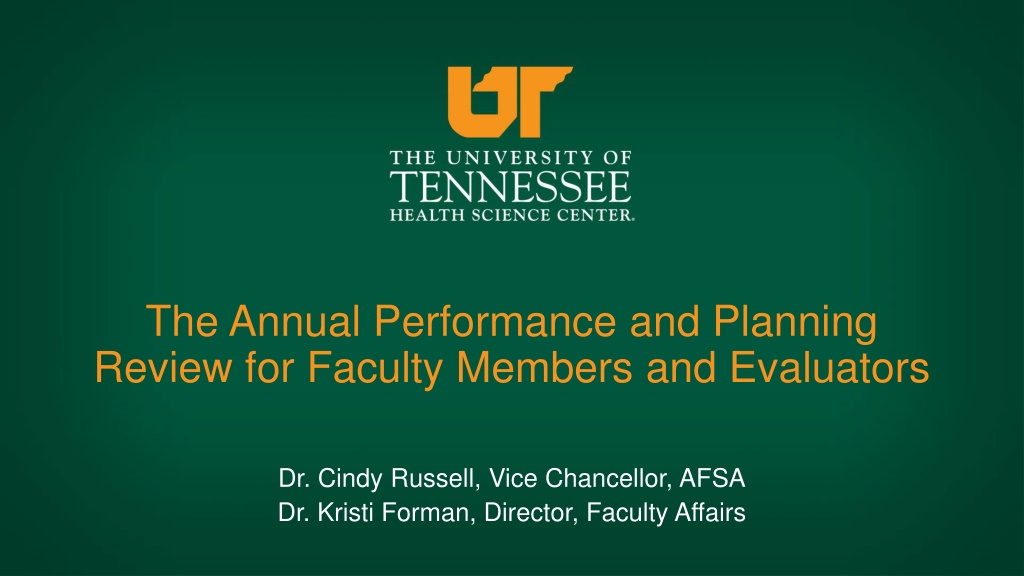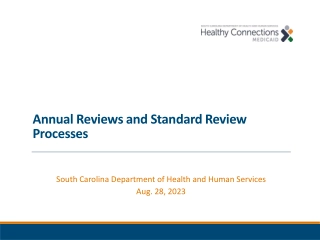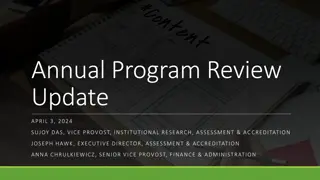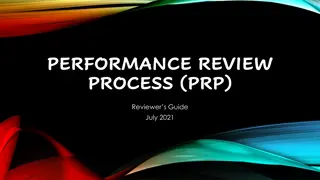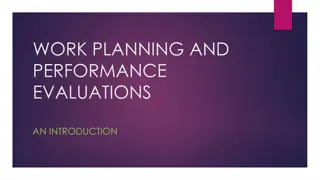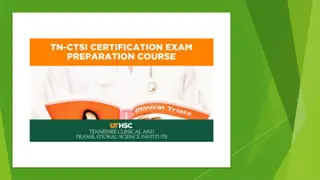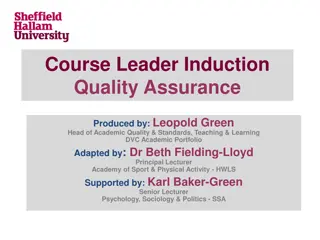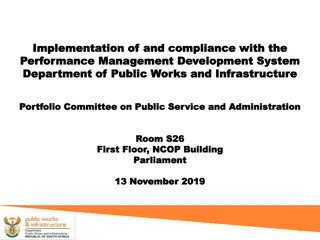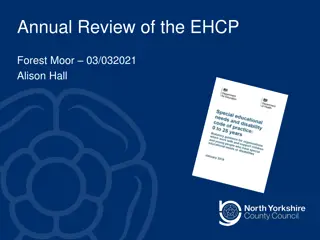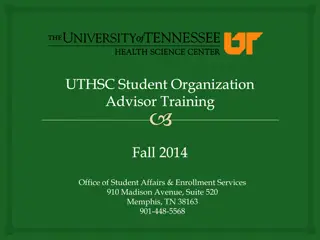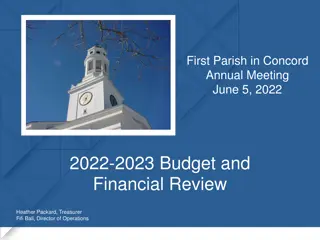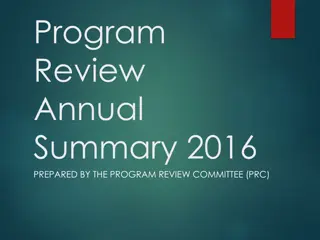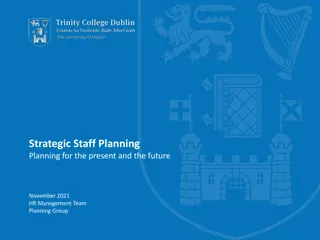Annual Performance and Planning Review Process at UTHSC
The Annual Performance and Planning Review (APPR) at UTHSC is a formal evaluation process that assesses faculty members' contributions to the university's missions through teaching, research, service, and clinical care. It provides clarity, feedback, and guidance for career progression and plays a crucial role in merit pay decisions, tenure evaluations, and performance-based adjustments. The process outlines specific goals, indicators of success, and procedures to ensure effective communication and alignment with departmental and university objectives.
Download Presentation

Please find below an Image/Link to download the presentation.
The content on the website is provided AS IS for your information and personal use only. It may not be sold, licensed, or shared on other websites without obtaining consent from the author. Download presentation by click this link. If you encounter any issues during the download, it is possible that the publisher has removed the file from their server.
E N D
Presentation Transcript
The Annual Performance and Planning Review for Faculty Members and Evaluators Dr. Cindy Russell, Vice Chancellor, AFSA Dr. Kristi Forman, Director, Faculty Affairs
Topics APPR: What is it, who requires it, why is it important, when is it done General goals of the APPR and specific processes APPR procedure Indicators of a well-done APPR Clarifying assignments and goals Performance ratings Resolving disagreements about the APPR
Relevant Faculty Handbook Guidance Appendix J Procedure for the Annual Performance and Planning Review Section 4.14 Career Development and Evaluation of Tenure Track Faculty Members Section 4.16 Career Development and Evaluation of Tenured Faculty Members Section 5.3 Career Development and Evaluation of Nontenure Track Faculty Appendix K Procedure for the Interim Probationary Review for the Award of Tenure
The What, Why, Who, and When of APPR
APPR is a formal review that examines the current/previous year s activities and planning what should occur during the current/coming year. proceeds from guidelines and criteria which are appropriate to the department, college, and UTHSC. should take place in the context of longer-term goals for the campus, college, and department. focuses on the faculty member s contributions to the University s missions through teaching, research (including scholarly and artistic work), service, and clinical care. is a key element in determinations of merit pay or performance-based salary adjustments. Board of Trustees BT0006 Policies Governing Academic Freedom, Responsibility, and Tenure
Why an APPR? Provides clarity to faculty regarding progression toward career milestones Clarifies areas of exemplary performance Points out areas where improvement may be warranted Provides an annual review upon which to judge positive or negative performance Foundation to build on yearly Provides a history of corrective feedback/recommendations to address performance issues Provides information for regular processes, such as tenure, promotion, Post-Tenure Review (PTR), Enhanced Post-Tenure Performance Review (EPPR)
What is the goal of the APPR? Facilitate communication Clarify short- and longer-term goals and expectations Clarify departmental goals and the faculty member s role Recognize areas of exceptional performance Identify areas of performance that deserve additional effort Develop documentation to use for determination of salary, promotion, and tenure recommendations Essentially, To review your performance To receive your work assignment To mutually establish your goals
Who requires an APPR? All regular faculty members, full or part-time Tenured Tenure-Track Non-tenure Track Includes administrators who also hold regular faculty appointments Chancellor Some Vice Chancellors & some modified VC titles Deans & some modified Dean titles Volunteers Friends Affiliates
Who requires an APPR by start/termination Planning to resign/retire (in the early part of the year in which the APPR will occur) Actually resigns/retires (prior to March 31 of the year in which the APPR will occur) Recently hired (anytime during year under review) APPR is required. APPR is optional. APPR is required. Until gone, the faculty member is here. Performance review could be appropriate. APPR provides a quick check and opportunity for a tune- up in case any redirection may be required. Require the performance review portion for the year under review. No need to do the planning portion. APPR reinforces goals and assignments for the calendar year. May hold on the planning of goals and assignments. If resignation/retirement doesn t occur, then need to conduct the planning portion. If the faculty member remains past March 31, the full APPR is required.
When is APPR conducted? Between January 1* and March 15 of each year Reviewing activities and performance for the preceding calendar year Setting the plan for the current calendar year through the setting of goals and assignments *Faculty submission step opens in Digital Measures on December 1
Digital Measures: APPR Workflow Digital Measures User Guide https://libguides.uthsc.edu/digitalmeasures APPR User Guide https://libguides.uthsc.edu/digitalmeasures/APPR Includes information on how to access your workflow, common questions, and tips on reviewing your annual report. APPR Video Tutorials https://libguides.uthsc.edu/digitalmeasures/APPR- videotutorials User Guide includes faculty/chair videos, as well as PDF versions of the video scripts and workflow steps General schedule of sessions: Introduction to Digital Measures, Tuesdays, 1-2pm Faculty APPR training, Tuesdays, 8-8:30am CDT; Thursdays, 4:30-5pm CDT Evaluator APPR training, Wednesdays, 12:00-12:30pm; Fridays, 12:00-12:30pm CDT We will schedule a unique session for your unit!
Procedural Steps for the APPR 1. Faculty member provides required documents Summary of activities and accomplishments Summary of proposed academic goals 2. Evaluator reviews documents 3. Faculty member and Evaluator meet Review performance Receive work assignment Mutually establish academic goals 4. Evaluator prepares narrative summary of discussion including expectations of the faculty member for the upcoming year 5. Faculty receives and acknowledges review with option to write response
The Role of the Evaluator Provide an appraisal of performance based on prior year s assignment(s) and goal(s) Meet with faculty member to discuss performance review and career development Provide current year s assignment(s) and mutually agreed upon goals Assign overall performance rating and rating in each mission area Assign effort allocation for current year
Specific processes concurrent with the APPR Tenure-Track Faculty Members Mandatory Interim Probationary Review for Tenure Conducted in year 3 or 4 of the probationary period at the Chair s discretion Departmental or, if insufficient tenured faculty, Collegiate Appointment, Promotion, and Tenure Committee involved Progress towards Tenure Each annual review required to include a statement of progress As Appropriate Progress towards Promotion Initiating or Reviewing Annual Review Improvement Plan Reviewing Progress on Enhanced Post-Tenure Performance Review (EPPR) Improvement Plan
What makes a good APPR Authentic In both process and substance Accurate Genuine Meaningful Synergistic
What makes a good APPR Covers all required elements and follows all applicable procedures Focuses simultaneously on faculty member s and departmental/collegiate needs Covers a year, but looks backward and forward to provide meaningful input to professional growth and academic achievement Allows for sufficient time for conversation and discussion; not perfunctory; not merely a review of documents sent back and forth Clearly elaborates any relevant performance issues with specific recommendations for the future When possible, provides faculty with an indicator of their performance in comparison with departmental colleagues Is written uniquely each year At each rank, provides continued encouragement and strategies for moving to the next level with expectations for gradual achievement If already a professor, speaks to expectations of ongoing contributions for the department, college, and profession As appropriate, speaks to: Progress toward tenure (each year, plus the mandatory interim probationary review in year 3 or 4) Initiating or reviewing an Annual Review Improvement Plan Performance on the Enhanced Post-tenure Performance Review Progress toward promotion
Clarifying Assignments and Goals Assignments Goals Area of assigned responsibility Equitable and fair Broad statement of desired outcome Some portion achievable in the next year Not identical Builds toward larger career goals Considers mission, goals, and needs of the college and its academic programs Set for each assigned mission area Variable over the years Considers the talents and needs of individual faculty Variable over the years
Faculty Handbook: Assignments The specific academic assignment of the individual faculty member is determined cooperatively by the faculty member and the University, with appropriate regard given to both the academic interests of the faculty member and the academic needs of The University (Section 4); however, the final decision regarding the faculty member s specific academic assignment rests with the Chair and/or Dean (Section 4.3.1). [Section 1.3: The Faculty of UTHSC] The Chair is responsible for the management of the department's activities, including direction of the work of the faculty. The assignment of faculty workloads and work sites is the responsibility of the Chair, in consultation with the Dean when appropriate. The Chair is responsible for the equitable assignment of faculty responsibilities and assures that an appropriate balance of time and effort is committed within the department to teaching, research, service, and, if applicable, patient care. [Section 4.4.1: Role of the Department Chair] In addition to individual efforts, each faculty member is expected to function as part of a departmental team and to demonstrate a sense of collegiality. As such, he/she should show an interest in the success of the department as a whole by accepting assignments, actively serving on departmental, college, University, or national committees; attending departmental / college functions; and actively participating in community-based service projects. [Section 6.7: Guidelines for Promotion in Rank] The assignment of faculty workloads is the delegated responsibility of the Department Chair. The Chair is responsible for the equitable assignment of faculty responsibilities and assures an appropriate balance of time and effort committed to teaching, research, public service, and if applicable, patient care. Specific teaching assignments are usually made on a semester basis by the Department Chair. As is customary in most health science centers, faculty at UTHSC are assigned to specific duties consonant with their individual expertise in teaching, research, or patient care. [Appendix J: Procedure for the Annual Performance-and-Planning Review]
Faculty Handbook: Goals Tenure-track/Tenured Annually, each tenure track faculty member in his/her probationary period (or tenured faculty member) must meet with the Chair to review his or her performance in achieving previously established academic goals, to receive the work assignment, and to mutually establish the academic goals to be achieved by the faculty member during the coming year [Section 4.14.3.2: Annual Performance and Planning Review; Section 4.16.3: Annual Performance and Planning Review] Non-tenure track That Annual Performance and Planning Review is based on criteria and guidelines appropriate to the specific department, college, and campus, and the meeting serves at least four purposes: 1. To review and discuss the faculty member's performance in achieving previously established goals; 2. To convey the faculty member s work assignment for the upcoming year or other appointment period; 3. To discuss and establish the academic goals to be achieved by the faculty member during the upcoming year or other appointment period; and 4. To provide the faculty member with a routine opportunity to seek and receive advice and guidance. [Section 5.3.2: Evaluation Through the Annual Performance and Planning Review]
Example Assignments and Goals 1. Serve as the instructor of record for XYZ101: Course name. 2. Submit at least two data-based manuscripts as primary/corresponding/lead author for publication in peer-reviewed journals. 3. Present a refereed presentation at a national professional conference. 4. Incorporate and evaluate the use of one new pedagogical practice in XYZ508: Course name. 5. Obtain initial certification [or complete recertification requirements] for ABC Specialty. 6. Implement MNO-strategy and assess for improved patient satisfaction in clinic. 7. Enroll in and complete the [whichever-is-relevant] track of the Teaching and Learning Center s Teaching Excellence Institute.
Faculty Performance Ratings UTHSC has a 4-point rating scale for faculty performance Exceeds Expectations for Rank Meets Expectations for Rank Needs Improvement for Rank Both ratings are considered negative ratings. Unsatisfactory for Rank
Faculty Performance Ratings Through the Years 2020 2018-2019 2017-2018 Rating # % # % # % Exceeds 555 34.8% 562 37% 532 40% Meets 975 61.1% 926 62% 785 59% Needs Improvement 9 <1% 9 <1% 17 1% Unsatisfactory 4 <1% 2 <1% 4 <1% TOTAL 1543 1499 1338
Positive Faculty Performance Ratings Exceeds Expectations for Rank Achieved and consistently exhibited unique and highly meritorious levels of professional performance beyond the agreed-upon goals and objectives. Meets Expectations for Rank Achieved and consistently exhibited the level of the expected performance on the agreed-upon goals and objectives. Assigned to an individual who has contributed to the mission, goals and objectives of the department, college, and university, as well as to his or her professional field. Assigned to an individual who achieves uncommon levels of meritorious performance in his or her field; and makes meaningful and significant contributions to the mission, goals and objectives of the department, college, and university, as well as to his or her professional field.
Negative Faculty Performance Ratings Unsatisfactory for Rank Failure to demonstrate professional competence in teaching, research, or service*; or Needs Improvement for Rank Exhibited a level of performance that did not consistently meet all the agreed-upon goals and objectives. Failure to perform satisfactorily the duties or responsibilities of the faculty position, including but not limited to (1) failure to comply with a lawful directive of the Chair, Dean, or UTHSC Vice Chancellor for Academic Affairs with respect to the faculty member s duties or responsibilities; or (2) inability to perform an essential function of the faculty position, given reasonable accommodation, if requested. Assigned to an individual who may require some assistance or feedback in achieving and sustaining a level of professional performance necessary to meet the agreed-upon goals and objectives. Intended primarily as a means of formally communicating that a special effort must be made in addressing specific performance deficiencies.
Financial Implications Exceeds Expectations: Eligible for significant merit pay or performance-based salary adjustment that is consistent with campus, college, and departmental fiscal situations. Meets Expectations: Eligible for minimum merit pay or performance-based salary adjustment that is consistent with campus, college, and department fiscal situations. Needs Improvement for Rank: Not eligible for merit pay or performance-based salary adjustment. Unsatisfactory for Rank: Not eligible for any salary adjustment.
Other implications of negative rating Needs Improvement for Rank Unsatisfactory for Rank Tenured faculty: If 1st NI during any 4 consecutive APPRs, an Annual Review Improvement Plan (ARIP) is required. If 2nd NI during any 4 consecutive APPRs, an EPPR must be initiated. Tenured faculty: Enhanced Post-Tenure Performance Review (EPPR) is required. Tenure-track faculty: ARIP or non-renewal of appointment. Tenure-track faculty: ARIP or non-renewal of appointment. Non-tenure track faculty: ARIP or non-renewal of appointment. Non-tenure track faculty: ARIP or non-renewal of appointment.
Disagreements About APPR & How to Resolve Them
Resolving disagreements about the APPR I didn t get to meet with my department chair. They just sent me my documents to sign. Request a meeting. It s your right. I don t mutually agree with the goals as they _______ (are too hard, are too easy, take my focus away from where I d rather it be, don t take my interests and skillset into account, etc ). Continue discussion to resolution Increase the goal | Decrease the goal | Change the goal | Omit the goal I don t agree with the chair s narrative summary as it doesn t contain some explanations and narrative that I consider important in understanding my performance in the period under review. Talk with the chair Write an optional response I don t agree with the rating. It should be higher. Talk with the chair Write an optional response
Resolving disagreements about the APPR I don t agree with the assignment and I m not going to do it. Remember the Handbook language about assignments? The specific academic assignment of the individual faculty member is determined cooperatively by the faculty member and the University, with appropriate regard given to both the academic interests of the faculty member and the academic needs of The University (Section 4); however, the final decision regarding the faculty member s specific academic assignment rests with the Chair and/or Dean (Section 4.3.1). [Section 1.3: The Faculty of UTHSC] Your disagreement with an assignment does not permit you to ignore the assignment. You are expected and required to fulfill the assignment. Obey a lawful directive of the chair while you work to address your concerns. Write an optional response. File a grievance.
Any questions. Any time. Kristi Forman, DBA Director, Faculty Affairs kforman1@uthsc.edu o: 901.448.3285 || c: 901.484.3325 Cindy Russell, PhD Vice Chancellor, Academic, Faculty, and Student Affairs crussell@uthsc.edu o: 901.448.6158
